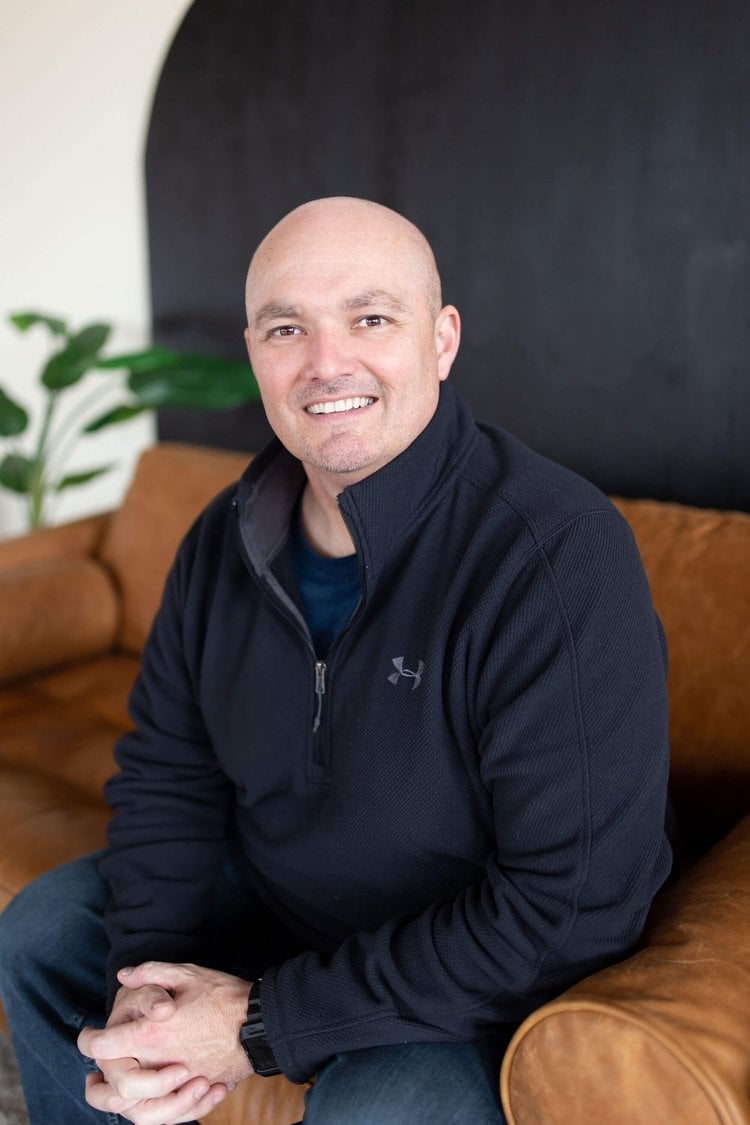Control Yourself Not Your Environment
In this transcribed episode of the Shrink Think Podcast, Nathan and Aaron talk about self control— how to control whatever is going on inside of us instead of turning it outward toward others.
Aaron Potratz:
Hey everyone, welcome to the Shrink Think podcast. We are very excited here, actually, Nathan's very excited. I'm just normal excited. If you're watching on YouTube, you know exactly what we're talking about and if you're not watching on YouTube and you're just listening, you better head over to our YouTube channel.
Nathan Hawkins:
Unless you're driving, then you can just watch us. It's very weird that people want to see us while we're talking.
Aaron Potratz:
I know, but not when you're driving. This is like my little disclaimer. I don't want to be responsible for any accidents out there.
Nathan Hawkins:
Watch out for that squirrel.
Aaron Potratz:
Yeah, hit your brakes right now. I wouldn't mind being responsible for an accident. Somebody's just laughing so hard at something we said and nope. I was listening to the shrinking podcast. I was so into it that I forgot about the world around me, but we don't want anybody to get into accidents or having any accidents in their pants. Let's move right along. Let's do that. Let's do, so today we are going to be talking about controlling yourself. Speaking of the subject, not even joking. That was such a perfect segue. So the idea is that a lot of times we have feelings that are going on. We maybe feel anxious, we feel frustrated, we feel just whatever the thing is going on inside of us, and a lot of people turn outward. It's kind of like this external locus of control that we've talked about in the past. A lot of people, we turn outward to control our environment or control other people because there's a hidden belief that's underneath all of this that says that if I can control you or stop this thing from happening or control my environment,
Nathan Hawkins:
I feel so much better.
Aaron Potratz:
I will feel so much better. But the problem with that is that you are responsible for your feelings and your feelings are inside of you and your stress or your frustration or anxiety is inside of you and in your body, not in your environment around you. I mean, those things can kind of exacerbate stuff or whatever, but it's more about what's going on inside of you. So we're going to kind of talk about what that means, what that looks like, why that's important, maybe even a little bit of how that it has been or can be destructive in your relationships or for the people around you, because ultimately we want you to be aware of what you're doing and how that might be impacting people so that you can be like, oh yeah, I don't want to do that anymore. That's probably a good idea. Those shrink thing guys know exactly what they're talking about.
Nathan Hawkins:
Very good. So there's different ways that different personalities actually deal with this. Introverts have a tendency to isolate and extroverts have a tendency to just make you think differently. They want to influence you, change you because persuade. Persuade because they may not like what's going on in a given moment. In an extreme example, which I feel like maybe is not that extreme anymore, I don't know. This whole thing around being offended is similar to this. So if you're going to have a, not going to have, but it comes from a victim mentality. So you have an idea that you are somehow less than of this big culture that's going on right now, which I've got a teenage daughter and I hear about this stuff with the drama at middle school and that kind of thing. Everybody's trying to assign themselves disorders. I'm an anxious person. I probably have autism.
Aaron Potratz:
Oh yeah. Well, I'm an anxious avoidant person. My disorders worse than yours. I get the most special treatment.
Nathan Hawkins:
Right? So it's like if I can label it or if I can remind you that you have to be different because I have this disorder or whatever, you should know better because I'm this way or I'm offended that you said that. So you can't say those things. There are some legitimate offensive things that people do and say that are intended to humiliate or degrade. On the other hand, when somebody is explaining something and they say the wrong word because they're just, I don't know, they're just talking and it comes across different or they
Aaron Potratz:
Just say something that they're not trying to be offensive. They're not saying anything that's necessarily offensive, but you are offended by it.
Nathan Hawkins:
Right? There's kind of two different personality perspectives on that too, because one will be, they just need to inform you. I don't know if you know this, but what you just said was very offensive
Aaron Potratz:
Versus what you just said. I am offended by or I feel offended by.
Nathan Hawkins:
And honestly, you can let somebody know that, as we talked about before, we're not telling you not to verbalize what's going on in your space. What we're saying is you can't expect that by doing that. You're controlling all the space. It's just unrealistic to think like, oh, if I share this, then everybody's going to be totally different. And if they're not, then I'm entitled to be more a fricking jerk to everybody.
Aaron Potratz:
And maybe even it's like I have, yeah, you said entitled, I have a right. And maybe even people look at it as I have a responsibility, like a social responsibility to the world around me or a responsibility to you to make sure that whatever this thing is, and so that actually is putting you in a power over position over other people or over the scenario, which is that's not a good thing.
Nathan Hawkins:
I'm not really trying to make it this thing. We've actually did a podcast on not being offended. I'm using this as an example because it's kind of one of those clear ones that everybody's, A lot of people I think have experienced this with friends and maybe you yourself have been like, man, that freaking bugs me and choices that you might make regarding that would be, I'm not hanging out with that person anymore. I would challenge that one because you're talking about based on how you feel in certain circumstances around the person, you're going to now not spend any time at all in all the circumstances because of a few circumstances.
Aaron Potratz:
And so what you're doing is you're also limiting your environment to only the things that make you feel comfortable. And again, we're assuming that kind of assuming the best about other people, we're giving people the benefit of the doubt because people say and do things that are inadvertently hurtful or offensive or disrespectful or something like that. We all do that. That's not what we're trying to do. It's not our intention at all. And so there needs to be some leeway, some space where people can do things that we're uncomfortable with or we don't like, and that's just a normal part of relationships. So what you're doing essentially by removing that person from your life is you're saying, I need to live in this bubble or create a bubble around me where I'm only surrounded by the people and the things that I like and I agree with and I'm comfortable with. And that's not the real world.
Nathan Hawkins:
No, it's not. I'm a two on the Enneagram. I have more of a tendency to care about what other people are thinking or doing, and I don't want to offend somebody or not that our listeners are out there going, well, dang it, I really wanted to,
Aaron Potratz:
If you are, please go listen to our Don't Be offended podcast.
Nathan Hawkins:
Well, I'm thinking in terms of Enneagram eights wouldn't worry about it as much. They'd just be like, I'll just tell you what I think and however you do it,
Aaron Potratz:
Not because they want to be rude, they're just not concerned about what other people think.
Nathan Hawkins:
So in that way, what I find myself doing, I've got a couple friends that I limit my time with, and so I have to do some thinking about this because I naturally will. It takes so much energy for me to edit myself when I'm with them that it's exhausting. I am trying so hard to respect where they're coming from.
Aaron Potratz:
Are you saying that I'm difficult to be around Nathan? Are you telling me that there's something wrong with me? That you have to edit yourself? Is that what you’re,
Nathan Hawkins:
Well, I didn't want it to come out this way, but now that we're here in the podcast, I can't believe
Aaron Potratz:
You're, are you passive aggressively trying to say this to me on the podcast while we're recording right now, less passive, more assertive?
Nathan Hawkins:
No, but what I've had to think through, I've got into myself and gone, okay, what is the deal? This whole thing where I'm assuming, I'm assuming some things. First of all, I'm assuming that there's whatever's going on in my head space at any given moment. I am nervous to share it because we're going to get sidetracked on some conversation. It's going to get bigger than I want it to be. It's going to be misinterpreted, it's going to be somehow viewed a certain way. So then I just don't say it. And as I started thinking about this, I'm like, well, wait a minute. I be myself with this person, so how much internal management do I actually need to do? Because the reality is I am who I am and it's also the other person's responsibility to somehow in their own world respect the fact that I've got my own process and that's not my job to manage their process ahead of time.
Aaron Potratz:
There's a certain amount of mutual respect that you're describing that you're wanting from the other person and that you are giving to the other person from the standpoint of I've got my personhood and my space to be myself. And sometimes that's going to bleed over into or rub up against who you are, and there might be some of those friction points, but that's kind of like the grace and the space of relationships where that's going to happen sometimes, and that's okay, and vice versa. On the other side toward me, you want some space to be yourself, and sometimes I might find that difficult or frustrating or offensive or whatever that may be, but I'm giving you space to be yourself, and I'm not trying to control you like, well, this is who you are.
Nathan Hawkins:
Ever felt like you needed someone who really gets what you're going through. Meet the peer network where real understanding meets genuine support and mental health and addiction recovery.
Aaron Potratz:
So what is peer support? It's a powerful connection with someone who has walked a similar path. Our certified peer support specialists have their own stories of overcoming in mental health and addiction. They're here to share, listen, and guide.
Nathan Hawkins:
With the peer network. You are not just getting advice, you're gaining a partner in your journey, someone who empathizes relates and helps you navigate your path with their firsthand experience and professional training.
Aaron Potratz:
Through our telehealth platform. This support is as close as your phone or computer. It's a safe, confidential space where you can talk, learn, and grow all at your own pace and from the comfort of your own home.
Nathan Hawkins:
Whether you're seeking support for mental health challenges or walking the road of addiction recovery, the peer support network offers a hand to hold, an ear to listen and a heart that understands.
Aaron Potratz:
Visit the peernetwork.com to discover more. Your journey is unique and so is our support, the peer network, empathy and action support in every step. From that standpoint, I guess, let me just say this, it kind of reminds me of the remorse topic that we talked about in a previous episode that when you're saying you're sorry, you want to be impacted by the other person and how they feel or whatever. In a similar way, if I'm the other person and I'm allowing you, Nathan to be yourself and you say or do something that sort of rubs me the wrong way, the question that I always ask myself is, what is it about me that I'm so bothered by or frustrated about? Not like, oh, just blaming you are so this or you are so that because you are just being you, right? I'm kind of giving you the benefit of the doubt, and I'm saying you are just allowed to be you and who you are. Why? And how can I stretch myself grow as a person to make more space for that? So maybe I'm not so rigid or I've got more flexibility to absorb some of that without being so offended or getting so upset.
Nathan Hawkins:
Well, recently you and I were talking about, actually, we weren't talking, but this is kind of a way to explain the space component. I think it was like last week I was using your coffee mug. What I was going to do is we were at the Keurig and I was going to fill up this mug and then pour it into my thermos, and I grabbed it and you go, that's my mug.
Aaron Potratz:
I remember.
Nathan Hawkins:
And my first thought was, I'm not using it, I'm just going to pour it out, whatever. But then I thought, well, this is not my mug. So I said, would you like to have me not to do this? And you said Yes. I can't remember exactly what I said, but it was somehow I asked you about, do you want me not to do it or do you want it now or something? And you said, yeah, so I just gave you the mug and I just got a different one. But the thing that I had to go through in my mind, even as I reflected was I had all these, well, not like a lot, but I had what I had as valid reasons in my mind to do what I was doing. That also that should not offend you, bother you, or you should not care about these. I'm just going to do it. But then I thought he has his experiences. I want the mug now, and I dunno if there's a time thing or whatever, and I thought, I can't get to usurp that and just assume that I can do whatever my reasons are. You have to then you should obey them.
Aaron Potratz:
Well, and I mean this is a little bit of a sidetrack, just a really quick rabbit trail. But that's why I think communication is so important because afterward we talked about it or whatever, and you're like, I just was going to fill it up and then dump it out or whatever. I wasn't going to drink out of it because essentially in my mind I was like, oh, you're going to use my mug. I mean, it's literally, I made it. I painted or whatever. You were going to use my mug and drink out of it, and then I have to use something else. But that's not what you were going to do. So once you told me that, I was like, oh yeah, you can use my mug if that's all you're going to do with it. This is why communication is so important between people and also it's why it's getting us back on topic as well. It's so important that you manage those things that are going on inside of you because that could have been an unnecessary conflict or argument between us where it's like, why are you using my mug? And you legitimately have good reasons and you're not really doing the thing that I think you're doing. And so I would've just gotten upset. We would've had this argument over no legitimate reason.
Nathan Hawkins:
It's funny because there's those two sides of that, and in some ways just managing your own space and respecting the space of others actually works as a default to where you just, even in a misunderstanding, it doesn't go where it shouldn't because you're just going to respect what's going on.
Aaron Potratz:
They're shocks on a bike or on a car where they absorb some of the impact of things to make your ride smoother or to make it so that what's happening inside. I'm holding a coffee mug or whatever. It's like if I've got a liquid in it, it's like if I go over bumps or holes in the road or whatever, and I've got shocks, it's a pretty smooth ride. I'm not going to spill. Bad things aren't going to happen. But if I don't have those shocks, I'm like, throw it into my face.
Nathan Hawkins:
I honestly thought there was something in there. I was like, what are you going to do? You have to see That's video. I thought he is going to throw something in his face. So some of this is just, it's respecting what's going on for you. But as you understand, as you take the time, for example, in my previous example, I'm talking about, it's not like I'm not going to spend time with these people. It's that in my mind I'm like, man, that's going to take a lot of work and I just don't want to do that today or something. But then as I explored it, I was like, wait, I'm automatically withdrawing the permission. I am entitled to be who I am. That's dumb. I at least need to do that and then see what happens because I'm not even the other person a chance to respond to those other things. And that doesn't mean there needs to be kind of an argument about it.
Aaron Potratz:
You're making assumptions and you're also predicting the future that has not even happened yet. And you're also taking away a potential opportunity from the other person, from me, for example, to do the right thing or to respond in a different way. Or maybe it's an opportunity for me to grow of like, oh, you know what? Let me ask a question or let me let Nathan be more of himself. It's like, you could be taken away that opportunity from me just because of your own anxiety.
Nathan Hawkins:
I've got. So at home, we play games as a family a lot. We have game night where I have friends and family come over, and so I am called next level. They'll call me because what happens is somebody will say something that's mildly I, a provocative, I know where this is going, and I will just go one level and they go, of course. Okay, we shouldn't bring this up. When Nate's around.
Aaron Potratz:
When we're talking levels, we're talking like most people are about a 10 foot level from one story to the next. Nate's like a hundred feet is the next level.
Nathan Hawkins:
You know what I hate? I hate X, Y, Z. You know what I hate? And they're like, don't say it. But I actually do try to keep in mind that there are going to be situations with that that I need to respect. So that is me. But on the other hand, I don't necessarily need to go where my mind goes. Like say this. I can go like, you're in a mixed company. You got to be that's, or you're on a podcast. Which is why it sucks. I want to so bad give you some examples so bad, but I just sound like a bill. Just then we got to turn for home here. This has got to be in up a little bit, bit of a shorter podcast. I'm sorry, little campers. You're sitting by there having a little marshmallows, camping, listening to us.
Aaron Potratz:
This is actually just a great opportunity for them to manage what's going on inside of them, the sadness, the fear, the anxiety of like, oh, no, what am I going to listen to next?
Nathan Hawkins:
They have to do a longer one. So I think we got at the gist though. Is there anything that you wanted to add?
Aaron Potratz:
Yeah, I think so. The original concept is instead of controlling other people or the environment, because what you're describing is you're turning inward and asking yourself questions are what we call intro specing, right? Intro is inside yourself, or specing is like you're examining or evaluating whatever. So you're examining inside of yourself, what am I thinking? What am I feeling? What are my options? Or what am I going to do as opposed to turning outward toward blame or criticism, or I guess it would be control. It's like telling somebody else what they need to do. Oh, you're doing this. You shouldn't do that. You need to be doing this. That be like, what I'm essentially saying is, if you did these things, then I would feel better. It's your job to make me feel better. And that's not true at all. What we're saying is it's my job to know myself and to make myself feel better, to feel grounded. And so everything you were describing is like, oh, yeah, if I make those adjustments inside myself, that's better for both of us.
Nathan Hawkins:
And the other, I introduced this, we were talking about, well, actually Aaron introduced this, but talking about the difference in personality, those folks out there that are more introverted, your tendency is going to be to isolate, right? But the same thing we're talking about is what we're asking you to do is you would do the introspection, which is going to come really naturally. You're going to be a professional. But the challenge of what Aaron was talking about earlier on the assumptions that you're making and that you're not giving the people in your world the chance to be more of themselves, to grow in their own stuff, where you kind of put yourself out there a little bit, let somebody know something that maybe they wouldn't have known because you're okay to say it, and then letting it be.
Aaron Potratz:
And part of that is when you said you're making assumptions. We did a whole episode on our podcast about being honest with yourself. This is why being honest with yourself is so important. If I'm examining myself, then hopefully I will see that I'm making assumptions, and then if I'm being honest with myself, I will be able to admit, you know what? That's an assumption. That's not a good thing. I need to make space to see what's actually going to happen rather than assuming what's going to happen.
Nathan Hawkins:
And so it's interesting. It kind of happens two different ways for introverts versus extroverts, but the truth is, it's the same thing. And so it's about taking this stuff seriously and being able to, you can control how you interact with the world, but you can't control the world. Some of these folks, some folks that you get around, you might even have to just not be around. It's just too anxious. But the only way you're actually going to know that is if you take some time and do your thinkings about it. That's a new one for you. Have a great day.
Aaron Potratz:
Thanks for listening to our show. Don't forget to head over to Apple Podcasts, Spotify, Stitcher, or wherever you get your podcast, to leave us a review and subscribe to our podcast so you never miss an episode. You can also visit our website at www.shrinkthinkpodcast.com/course and sign up for our free email course Nine Ways to Overcome Fear and Self-Doubt. You'll get nine weeks worth of customized, practical strategies you can use to get past the fear that's holding you back in your life. Thanks again for listening.

Nathan
With 20 years in practice, Nathan brings tremendous wisdom, insight, and a warm sense of humor to his clients, clinicians, and community. Nathan is a Licensed Professional Counselor and Clinical Supervisor in Oregon. He’s the owner of Life Encounter Counseling and co-owner of Life Discovery Counseling Services, a mutli-site group practice. Nathan maintains his own client caseload while managing and supervising his counseling staff, and still finds time to teach on occasion as an adjunct professor at Multnomah University in Portland, Oregon.




